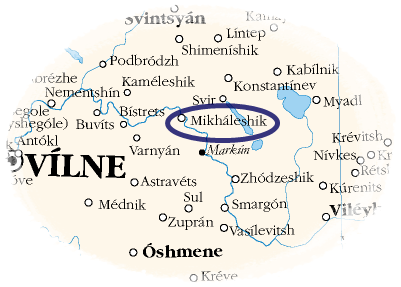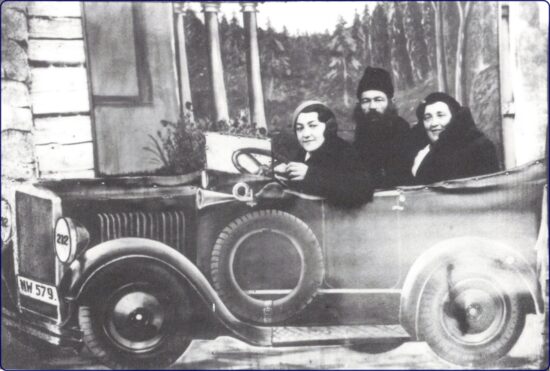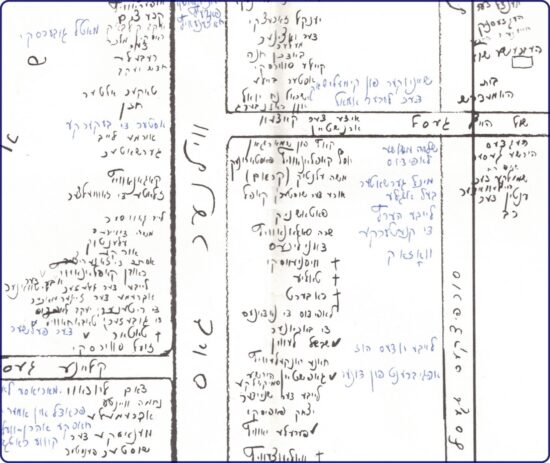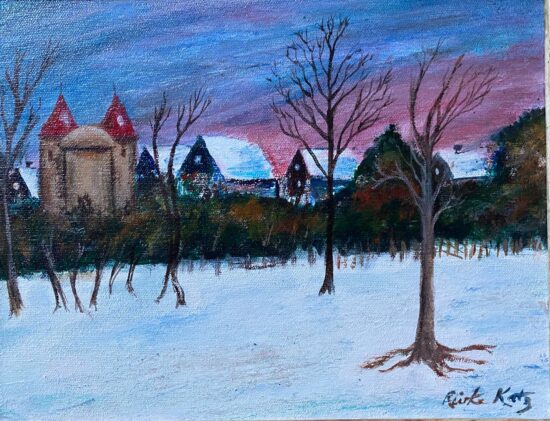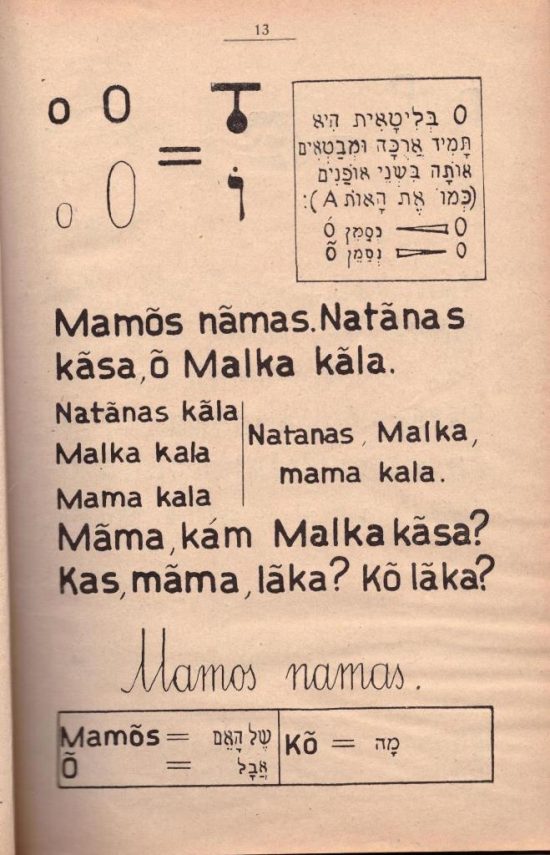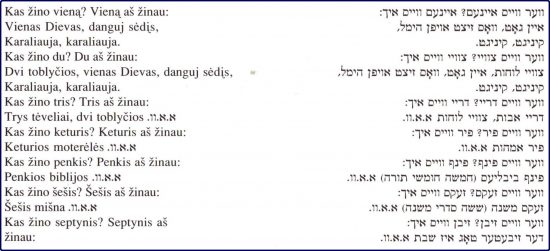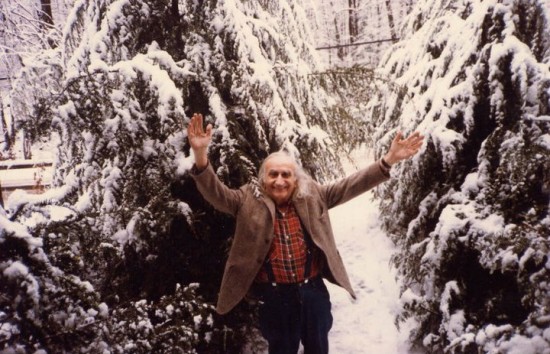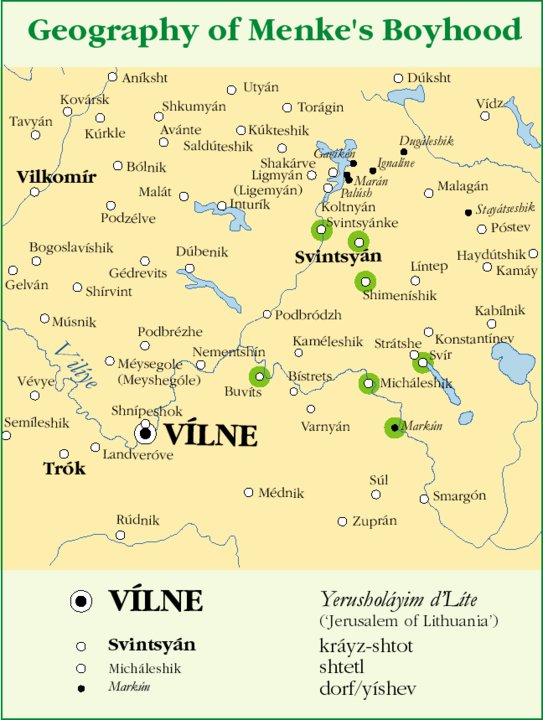on his 119th birthday and 34th yórtsayt
April 2025
◊
מעינקע קאַץ
אַ קראַנץ געקליבענע לידער צו זײַן 119טן געבאָרנטאָג און צום 34טן יאָרצײַט
זע אויך: דעם פּאָעטס ביאָגראַפיע; זײַן אויטאָביאָגראַפישע עסיי; זײַנע 18 ביכער (נײַן אויף יידיש, נײַן אויף ענגליש)
◊
א י נ ה אַ ל ט
◊
פרײַנט בײַם טיש
(מײַן פרי פאַרשטאָרבענעם פרײַנט: לייזער סאַפרין)
I
די אומרו נאָך ווײַטע לענדער האָט מיך קיינמאָל ניט געצויגן.
די בענקשאַפט נאָך וואַנדער האָט מײַנס אַ רגע קיינמאָל ניט פאַרצערט.
מיט פרײַנט אַרום טיש בין איך די וועלט, האַרץ צו האַרץ דורכגעפלויגן,
איז מיר וואַנדערן דורך שמועס, אַ לעבן לאַנג געווען באַשערט.
דער וואַנדער אַרום טיש איז די עלטסטע רײַזע אַרום דער וועלט.
דער פרײַנט אַרום טיש איז שענער פון יעדער שיינקײַט, דורך אַלע רײַזעס.
וואָסער זונאויפגאַנג קען, ווי אַ פרײַנט בײַם טיש, די וועלט צעהעלן.
וואָסער קונץ פון עראָפּלאַן, קען די וואונדער פון אַ וואָרט ווײַזן?
וואָסער שיף שווימט גרינג, ווי דער שמועס בײַם טעפּעלע קאַווע — הער:
אָט איז אַ וואָרט — נחס בלאַט, אָט אַ שפּרײַז: אַ ווינט — די ערשטע באַן.
אָט איז אַ וואָרט — אַ פעלדז, אַ גיבור וואָס ציט די ערד צו די שטערן.
אָט איז אַ וואָרט — אַ האַנט וואָס נעמט גאָר דאָס בייז אַוועק פון דאַנען:
בלײַבט אַלדאָסגוטס מיט גאָר דעם בלענד פון פרייד, מי און שפע פאַרגאַפט —
ווערט יונג די ערד, נײַ דער מענטש: אָדמס ערשטער בליק אויף וועלט באַשאַף.
II
אָ דער גליענדיקער שמועס מיט חברים ביז שפּעטער נאַכט.
דאָס ליכט פון קיינמאָל ניט פאַרגאַנגענע זונען לויכט אַרום טיש.
דאָס וואָרט איז די איינציקע שווערד דורך די מוראדיקסטע שלאַכטן,
דער גלי פון לחיימס קרײַזט און ווײַזט פּלאַנעטן אַרום טיש.
דער שמועס אַרום טעפּעלע קאַווע איז די ווײַטסטע נסיעה.
אָ, פאָרן דורך זוניקן געפּלאַפּל — פון דעם בלינדסטן אַמאָל,
ביז דער צײַט ווען אויף דעם אָרט פון תליות וועלן גערטנער בליען, —
ווען טורעמס פון חלום וועלן זיך פּאָרן מיט טורעמס פון שטאָל.
אָט ווערט דער טיש — אַ בייט פאַר דער ווײַטסטער נאָך ניט פאַרזייטער רויז.
אָט זעצט זיך מיט אונדז ישעיה בײַם טיש — דער קריגער קעגן שווערד.
אָט פירט אַ קינד אַ וועגעטאַרישן וואָלף פון תנ″ך אַרויס
און פאַריאָגט דאָס געוויין פון מענטש, פון בוים און חיה פון גאָר דער ערד.
אָ, דער שמועס מיט חברים זאָגט אָן דער וועלט, דורך שפּעטער נאַכט,
אַז בלײַבן וועט דאָס וואָרט — די איינציקע שווערד נאָך אַלע שלאַכטן.
פון: אינמיטן טאָג (1954), זז. 90 – 91.
◊
דער זייגער גייט
(מײַן טאַטע דער בעל דרשן, דרשנט צו זײַן 25טן יאָרצײַט) (1879 — 1951)
מײַן קינד, דער זייגער גייט און גייט, וויי, דער זייגער גייט!
אייביק איז דער זייגער, אַזוי קען גאָט אַליין נאָר גיין.
אַפילו פון אַ קלאַנג אַ ווידערקלאַנג וועט ניט פאַרגיין,
נאָר אַ טאָג אַזאַ וואָס איז קיינמאָל ניט פאַרגאַנגען פאַרגייט.
די פאַרטאָגן ווי קינדער וועלן אייביק אַזוי גיין.
מײַן קינד, דער זייגער גייט און גייט, וויי דער זייגער גייט!
אייביק איז דער זייגער, אַזוי קען גאָט אַליין נאָר גיין.
שטערן זײַנען זייגערלעך אין אַ בלאָנדזשענדיקער נאַכט,
און גיין קען אויך אַ פעלדז, כאָטש קיינער זעט ניט זײַן גיין.
דער טאָל גייט צום באַרג, דער באַרג וועט צום טאָל נאָך גיין.
אויך אין מײַן קבר שאַרט זיך די צײַט דורך אייביקער נאַכט.
ווי דאָס גראָז אין ווינט, ווי די בענקשאַפט בין איך שטענדיק וואַך.
ס′קען די מצבה קיין איינציקע שײַן ניט פאַרשטיינען.
משיח וועט קומען ווי זונאויפגאַנג נאָך דער לענגסטער נאַכט.
מײַן קינד, אַלט ווערט אַפילו דער טויט, ווי סʹווערט אַלט די נאַכט.
באחרית הימים וועט שטאַרבן אַפילו די צײַט,
בלײַבן וועלן אַלע ווײַזערס שטיין ווי פינגער פון טויט.
פון הימל און ערד, פון מענטש און זון איז עלטער די נאַכט.
ווי האָפענונג, זײַ שטאַרק קעגן טרויער פון ערב נאַכט.
דערהער דאָס געלעכטער פון אַ קינדס ערשט געוויין.
פאַרהער דאָס געוויין פון אייגענעם, לעצטן לאַכן.
מײַן קינד, דער זייגער גייט און גייט, וויי, דער זייגער גייט .
פון: צפת (1979), ז. 51.
◊
קעגן שלאָס און גראַם
ברודער,
פּאָעט, זע
דאָס ליד הינטער
גראַמען, ווי גראַטעס,
רײַסט זיך פון דורות יאָך.
לידער זיצן אין גראַמען,
ווי מענטש, פויגל און חיה אין
שטײַגן. איך האָב געזען ווי שמשון
הגיבור, מיט פויסט אין מויל פון אַ לייב,
זיך קאָרטשען אין דרײַען, אונטער דער משא
פון גראַם. גבורה געשמידט צו דער קלינגענדיקער
קייט — דעם גראַם, שמאַכט נאָך דעם פײַער פון וואָרט וואָס זאָל אויף
אייביק פאַרברענען די זשאַווערן פון גראַם. אין שימל
בלײַבט דער גראַם, אויב אַפילו מיט צאַרטסטער פײַל פון זילב געטאָקט.
זאָל דאָס וואָרט בלענדן פרײַ, ווי בליץ דורך כמאַרעס, קראַכן גראַמלאָז
ווי דונער, איבער אַ געחַלשט פעלד, אַ געבענטשטער
אָנזאָג אויף רעגן. אַ געיאָגטע סאַרנע דורך דער
שרעק פון וואַלד, לויפט ניט פונעם יעגער דורך גראַמען.
מצבות, די טרויעריקסטע שטיינער אויף
דער ערד, טרויערן ניט אין גראַמען. הער,
געלעכטער הילכט ניט פרײַ, פרילינגדיק
דורך גראַמען, אויב אַפילו דורך
דורכזיכטיקע קרישטאָלן
פון געשליפנסטן פערז
געלייטערט. דער גראַם
אויסגעגלעט, אויס
געקײַלעכט,
שנײַדט אין
לײַב פון
וואָרט זיך אײַן
ווי אַ וואונד, ווי
אַ ווערגנדיקע
רייף. אויב ווי דורשט, קוואַל, זון,
שטורעם איז אייביק דאָס ליד,
ווער קען די זון אין צעל פון גראַם
פאַרשליסן. ווער קען די אייביקײַט
צו אַ מאָס פאַרמשפּטן, דעם שטורעם
אין דער ענגשאַפט פון דער געציילטער אומרו
פאַרשפּאַרן. סײַ פון מענטש, מיסט, רויז, קרעץ, גיט ניט גאָט אין
קיין מאָס דאָס ליכט פון מאַיען, דאַרף דאָס ליד קיין מאָס,
ווי סʹדאַרף ניט די שיינקײַט קיין וואָג, ווי סʹדאַרף ניט קיין ווינט, קיין
פויגל קיין קאָמפּאַס. אַ פאַרטאָג הינטער גראַמען פאַרשלאָסן,
הערט בענקען ניט אויף נאָך אַ גראַמלאָזן שטראַל. אָ זאָל דאָס וואָרט
זײַן געשמאַק, ווי אין מײַן הונגעריקער קינדהײַט אַ פריש
פּענעצל ברויט. אָ זאָל דאָס וואָרט פאָרן סוף⸗לאָז דורך
צייט און רוים, ריידן פּנים אל פּנים, האַרץ צו
האַרץ, מיט מענטש פונעם ווײַטסטן, ליכטיקסטן דור.
מלחמות דורך ברענענדיקע פעלקער,
פלאַקערן ניט צום גראַם. אַן אַראָפּ
געשאָסענער עראָפּלאַן אַ
פאַרוואונדעטער אָדלער, פאַלט
ניט צום גראַם. קיין שטורעם
וואָרצלט קיין בוים ניט
אויס אין גראַמען,
אָ ברודער
פּאָעט.
◊
רעזומע
דער ים
אין פולער
רציחה איז
אַ גראַמלאָזער רוף,
נאָך אַזאַ ווײַטן טאָג
אָן תפילות, אָן שלעסער, אָן
ריגלען, אָן קייטן, אָן גראַמען.
פון: צפת (1979), זז, 65-63; מעינקע סאָנעטן (1993), זז. 17-15.
◊
לא תרצח!
זע, דאָס קעלבעלע בײַם ערשטן בליק אויף ליכט פון טאָג איז ווי גאָט אַזוי קלוג.
די מאַמע⸗קו הערט מעלה⸗גרהן ניט אויף צום בורא עולם אַ דאַנק,
פאַר הימל און ערד, פאַר זון און גראָז און פרייד, ווי קוואַל, פאַר אַלעמען גענוג, —
ווי זאָל איר אײַנפאַלן אַז פאַר זיסן שמאַנט גיט דער מענטש מיט טויט אַ דאַנק?
די מאַמע⸗קו לערנט סʹקינד אַז לעבן איז געשמאַק, ווי גרעזעלעך אין פעלד,
נאָר דער מענטש מיט חלף אויף האַלדז, שאַלט אָדעס צו יושר און צאַרטקײַט אויס, —
איז דען אַ וואונדער וואָס קַינס רציחה איז נאָך אַלץ דער האַר פון דער וועלט?
אוי, קעלבעלע, דײַן חן אינעם פעלד איז מקנא אַפילו די רויז,
נאָר אַז כ′זע דיך הענגען אין יאַטקע, מיט טשוואָק דורך האַרץ, צו רייצן פון מענטש סʹמויל, —
זאָג איך: רעד פון מאָרד בן⸗אדם, ניט פּלאַפּל פון דער שיינקײַט פון דער רויז.
שלום איז די הון וואָס בריט נײַע הינדעלעך — פאַנטאַסטישע פייגעלעך אויס:
דאָס הינדעלע אונטערן חלף פּאָרט זיך נאָר מיט חושך, מיט האַס און מיט גרויל.
אָ, אויב צום געבעט פון שעפעלע, קעגן שוחט, בלײַבט טויב ווי שטיין דער מענטש,
וועט קיינמאָל קיין שלום דעם מענטש ניט בענטשן, וועט שטענדיק מענטש קוילען מענטש.
פון: אינמיטן טאָג (1954), ז. 92.
◊
דאָס ליד פון אַ ליטוואַק
שלמה
המלך:
לידער פון די
ווײַנגערטנער קען דאָך
אַפילו אַ פּתי
דערהערן, אָ, איך זינג דאָס
געזאַנג פון אַלע געזאַנגען
צו דער בולבע, צו דעם יום⸗טוב פון
מײַן געוועזן שטעטעלע, די בולבע
איז פון אַלע פרוכטן דאָס שעמעוודיקסטע
פרוכט. פון קיין אויג ניט פאַרבאָרגן, בליען עפּל,
קאַרשן, באַרן, לאָזן זיך אָן בושה פון יעדער
שטראַל פאַרזוכן. בלומען ווי גאַסנמיידלעך קען איטלעך
בין פאַרנאַרן. די בולבע, ווי אַ ליטוואַק, לערנט
טיף דעם סוד פון ווערן, אונטער דער ערד. יע, אַז
פאַראַן מער סודות אין אַ בולבע, ווי אין
אַלע שטערן, ווייסט דאָס מינדסטע קערנדל,
דער גרעסטער חכם אויף דער ערד. אויב
אין ווײַנגערטנער זײַנען פאַראַן
שיכורלעכע לידער איז
דערפאַר אין בולבעס דאָ
דער טעם פון מײַנע
שטעטעלעך: סוויר,
מיכאַלעשיק,
סווינציאַן.
פון: צפת (1979), ז. 57; מעינקע סאָנעטן (1993), ז. 22.
◊
פּאָנאַר
I
פאַראַן אַ וואָרט וואָס הערט ניט אויף דאָס ליכט פון טעג צו שרעקן: פּאָנאַר!
פרעג מײַן שטעטעלע סווינציאַן אויב פּאָנאַר איז ניט יחזקאלס טאָל.
קומען וועט דער מענטש פון הונדערט יאָר אַרום פרעגן אין פּאָנאַר:
„צי קלאָגט דאָ יחזקאל אין ווינט דאָס געקלאָג פון ביינער טאָל.
„וועמענס געוויין גייט אויף און פאַרגייט אין פּאָנאַר: יחזקאלס טאָל?
די אוראַלט פאַרשיכורט, ווי דער ריח פון סאַמיקע בלומען,
דאָס געוויין פון דורות הערט גאָר ניט אויף אין פאַרשאָלטענעם טאָל.
וואָסער כח קען אין פּאָנאַר יחזקאלס געוויין פאַרשטומען?
„הער, פון שטיין קלאָגט מײַן פאָלק אַרויס, אָ, מענטש פון הונדערט יאָר אַרום,
לערן זיך פון אַ שטומען דאָס לשון פון אַ שטיין דערהערן.
ווייס, דאָ איז געווען אַמאָל אַ רויז, דער דאָרן, דער קרומער.
אָ, זאָג אַ וואָרט אַזאַ וואָס קען בײַטן אַ שטיין אין אַ שטערן.
„ווייס, אַ שטומער איז ניט דער וואָס קען דורך וואָרט אַפילו ניט וויינען , —
אַ שטומער איז דער וואָס קען דאָס לשון פון שטיין דאָ ניט פאַרשטיין.“
פון: אינמיטן טאָג (1954), ז. 73.
◊
אַ תפילה פון אַ שטיין
II
יעדער שטיין פון פּאָנאַר בעט זיך: צעהאַק מיך, צעזאַמד מיך, מענטש,
איך זאָל דאָ ווי דאָס גרויליקע האַרץ פון אַ גזלן ניט בלײַבן:
ס′זאָל מײַנס אַ שטויבעלע — אַ געיאָגט קערנדל מיט אָנהאַלט בענטשן,
ס′זאָל מײַנס אַ זעמדעלע צערוישן אַ קלאַנג פון אַ פאַרשטומט לעבן.
כ′זאָל דאָ ניט בלײַבן אין פּאָנאַר — אַ קיינמאָל ניט געוויינט געוויין.
כ′זאָל דאָ ניט בלײַבן אַ שטיין: אַ קיינמאָל ניט געזונגען געזאַנג.
וויי, איך האָב דאָ געהאָלפן די קלוגע ליטוואַקעס פאַרשטיינען,
איז וויל איך ווערן אַצינד — אַ וואונד וואָס טוט נאָר זיך אַליין באַנג.
כ′זאָל ווי דער ווינט, אָן אויפהער די ליטווישע שטעטעלעך באַוויינען,
ווערן אַ טרער וואָס קען די שטיינער פון גאָר דער ערד רירן,
אַזאַ טרער וואָס הערט ניט אויף דורך די נעכט פון פּאָנאַר צו שײַנען:
איך זאָל דעם קבר פּאָנאַר מיט ליכטיקע בשורות צעצירן:
בשורות פון דעם ערשטן פרילינג נאָך דעם לעצטן, לעצטן פּאָנאַר —
ס′זאָל אויך דעם שטיין, ווי דורך זיך אַליין, די קויל דורך אַ קינד אַרן.
פון: אינמיטן טאָג (1954), ז. 74.
◊
משיח
איך ווייס טאַטע, משיח וועט קומען פון מיכאַלעשיק,
וועט אויף אַן אייזעלע רײַטן דורך סוויר און דורך סווינציאַן,
דאָרט וואו די הייליקסטע ערד אויף דער וועלט איז פאַראַן.
איך ווייס מאַמע, משיח וועט קומען פון מיכאַלעשיק,
ווײַל אין גן⸗עדן געבליבן איז מיכאַלעשיק
און מיט די וואָרצלען איבערגעקערט ליגט אין הימל סווינציאַן
דאָרט וואו די בענקשאַפט איז ווי גאָט, אָן אַן אָנהייב, אָן אַ ברעג
וועט משיח קומען, אוי, מיכאַלעשיק, אוי סוויר, אוי סווינציאַן.
פון: צפת (1979), ז. 52.
◊
דער בראַווער פּחדן
אייביק וועט דער פּחדן,
פאַר מײַן שטאָלצער באָבע מאָינע זיך שרעקן —
ס′זאָל משה⸗רבינוס צויבער⸗שטעקן,
פון מאָכיקן שלאָף זי ניט וועקן;
זי זאָל אַ טויטע און אַ לויטערע פון אוראַלטן קבר ניט קומען:
פון זײַן קול — צעבויגן דאָס בלעכענע ברומען,
מיט איר אָטעם, די אויפגעבלאָזענע שטאָלצן צעבלאָזן,
מיט איר בלוט, דעם וואַסערדיקן רויט פאַרמעקן
און נאָר דעם כאָרכל פון דעם כאָרכלער לאָזן.
אייביק וועט דער פּחדן,
אויף טונקעלן שטעג דעם טרוים באַפאַלן
און דרייען זיך הייליק און ריטשען גערעכט:
„העי, פּאָעט, אַהער גיב פרייד,
פרייד — פאַר אומעטיקע קנעכט;
העי, פּאָעט, אַהער גיב שטראַלן —
ליכט — פאַר בלינדע קנעכט.
איך בין אַ הײַנט מיט טעמ′ען פול, ווי מיט זאַפט געשמאַקע סעדער.
דעם נעכטן, האָט שוין די צײַט דערוואָרגן,
דעם מאָרגן — פאַר קרענקלעכע בטלנים;
דעם הײַנט גיב אַהער, אַהער דעם הײַנט.
פון דײַן ליד שײַנט בית⸗עולם שרעק.
דײַן ליד — אַ טוכלער וועג צום מויזנלאָך:
ניט שטעק דײַן וואַנזין אין אונדזערע מונטערע רעדער.“
בראַוואָ, בראַווער פּחדן —
דײַן בראַזגנדיקער רוף,
וועט געוויס פון דרימל, אַ ציטעריק העזעלע וועקן,
נאָר איך וועל צום שלאַכט ניט פירן
מײַן ליד, מיט שטרויענעם גוף,
אויב אַפילו, טויזנט מאָל רויט צעצונדן.
מיט גבורה פון שטרוי, ווי קען מען בערג רירן?
דעם מעכטיקן פײַנט, ווי וועסטו שרעקן,
אויב אַפילו, ער זאָל אַליין זיך בינדן.
דײַן וואָרט — אַ מילב מיט פאַנטאַסטישן פויסט,
מאָנט פרייד — אַ פלאָקן די גרייס,
וואָס קען נאָך אומעטיקער זײַן?
פון גרויע רייד — אַזאַ שטורעם,
וואָס קען נאָך גרויער זײַן?
פון גרויע רייד — אַזאַ שטורעם,
ווער קען דערהערן?
מיט האַרץ פון שטאָל, מיט רואיק בלוט,
ווי קען מען שווערן?
אָי, ברידער פון נעכטן — אָי, שוועסטער פון מאָרגן:
עס שווערט מײַן האַרץ, עס שווערט מײַן בלוט,
אײַך וועלן ניט בייזע ציין צעקריצן.
אײַך וועט ניט גרייכן דעם פּחדנס רוט.
איך וועל מיט האַרץ און מיט בלוט אײַך שיצן.
אייביק וועט די אומעטיקע אַלטקײַט יונג האַלטן די ווײַנען.
אייביק וועט דער ווײַטסטער מאָרגן,
געאָרעמט מיט דעם ווײַטסטן נעכטן,
דורך צויבער פון נאָענטסטן הײַנט שײַנען.
דײַן צאָרן — אַ פײַער⸗ריז,
גענוג געוויס דעם אומעט פון אַ פליגעלע פאַרברענען —
וואָלט נאָר דײַן האַס געבן, דעם פײַנט אין אויג אַ גראַבל;
וואָלט נאָר דײַן פלאַם קענען, אַ פראָסטיק שטיבעלע באַהייצן.
ס′פּלאַצט דײַן וואָרט ווי ליכט אַ מבול,
גענוג אַזש — די נעכט פאַרפלייצן,
גענוג מיט שטראַלן — דורות שיך צו פּוצן —
נאָר מיר ווערט פינצטער⸗פינצטער פון אַזויפיל ליכט
און מיר ווערט טרויעריק⸗טרויעריק פון אַזויפיל פרייד.
און נאָר דײַן פרייד קען מיך שרעקן,
ווי אין אַ מעשה⸗ביכל — אַמאָל⸗אַמאָל,
אין מיכאַלעשיק, בײַנאַכט, אַרום בית⸗עולם:
ווען אַ גולם מיט אויסגעקלערטן קול,
מיט אַ שד⸗געזיכט און אַ תכריכים⸗קלייד,
פלעגט די מתים, מיט אַ פריילעך האָפּקע וועקן.
ווײַל דו ביסט אומעטיק ווי טויזנט „קוני⸗אײַלאַנד“ זונען,
איז אומעטיקער פון אַלע אומעטן דײַן פרייד;
ווײַל פריידיקער פון אַלע פריידן, קען דעם דיכטערס אומעט זײַן,
האָבן מײַנע טעג, אַזויפיל אומעט געפונען
און ווי סʹקען אויך די פינצטערניש דורך העלסטער פרייד שײַנען,
שײַנט אויך די פינצטערניש דורך מײַן ליד.
איך גיב דיר אַלע טײַכן פון רינענדיקע קראַנען,
איך נעם אַ טראָפּן — פאַרקלערטן טוי.
איך גיב דיר אַלע רעגנבויגנס פון ווערטערדיקע ראַקעטן,
איך נעם פון אַלע פײַערן — אַן איינציקן פונק
און האָלט האָב איך אַזוי:
אַן איינציקער פונק, דורך אַלע פינצטערנישן שפּאַנען
און האָלט האָב איך אַזוי:
זײַן אַליין דאָס ליכט וואָס העלט דעם חושך אַרום מיר.
איך האָב געזען,
אַ פונק — אַלע פײַערן פאַרשטעלן;
איך האָב געזען,
אַ בלינדן נעכטן — דעם מאָרגן צעהעלן.
איך האָב געזען,
דעם אָקטאָבער ווי טויזנט מאַיען בליען;
איך האָב געזען,
דעם שענסטן פויגל אויך פון וואָרים זײַן יניקה ציען
און איך וועל ווי דער פּחדן זיך ניט שרעקן,
מײַן וואָרט אויסטאָן נאַקעט, אַפילו אין מויזנלאָך.
איך האָב געזען,
אַ נאַכט אַן ענדלאָזע טאָגן;
איך האָב געזען,
אַ שטורעם — דעם פּחדן פאַריאָגן.
און ווען פון צופיל בראַזגען ווערט אויך טויב דער וויסטער בראַזגער,
שטומט אַ תפילה אויס, דער אײַנזאַמער פּויק:
קום, אָ בראַווער פּויקער, קום —
ווי זאָל איך אויסבענקען די וואָלקנס,
אַז ניט דער רעגן,
נאָר אַ האָגל האַרטע רייד פּויקט אין מיר,
קום אָ, בראַווער פּויקער, קום;
שטומט אַ תפילה אויס דער אײַנזאַמער פּויק:
קום, אָ בענקשאַפט — קום אָ ליבסטע קום,
ווײַל אַנדערשט איז אָן דיר מײַן פרייד — פון פרייד,
ווי אַנדערשט סʹאיז אַ דופטיקע פינצטערניש אין פרײַען פעלד —
פון אַ פאַרמשפּטער פינצטערניש אין טויטנקאַמער
און קום, אָ, טרויעריקע פלייט, —
גיב אַ טונקלקײַט וואָס נאָגט ביז לויטערסטן שײַן ,
אַ שײַן וואָס נעמט אַדורך ביז טונקלקײַט.
אָ, גיב אַ פרייד וואָס שוידערט אויף ביז טרערן —
אַ פרייד, אַ טרויעריקע פלייט,
וואָס הייבט די טיפן אויף,
און טראָגט זיי ביז דער בענקענדיקסטער הייך אַרויף —
אָ, גיב אַ פּײַן וואָס זאָל יאָנטעוון די וואָך.
פון: ס′האָט דאָס וואָרט מײַן באָבע מאָינע (1938), זז. 54-49.
◊
אַמאָל איז געווען אַ מעשה
(אויסצוג)
מײַן שטיבל איז אָרעם, מײַן שטיבל איז גרוי.
אַ פינגערל זון — אַ רעדעלע אומעט,
ווי אַ צעטראָטענע רויז, די גרייס —
דרייט אַרום מיר זיך אַרום, —
נאָר דעם אייבערשטן אַ דאַנק און אַ לויב,
ס′האַרץ איז ניט אָרעם, ס′האַרץ איז ניט גרוי.
זע, אויף די לאַטעדיקע שויבן,
אַזאַ צויבערדיקע נאַכט איז אַרויס —
אַ נאַכט מיט פייגל, מיט ווינט, מיט פלאַטערדיקן וואונדער,
מיט ליכט גענוג, אין ערשטער שעה צו טאָגן.
אָי, ווען כʹזאָל נאָר מײַן אייניקל,
פאַר די געסט — די שטערן,
מער כיבוד — מער פענצטערלעך פאַרמאָגן.
אונטער דעם פריילעכסטן פײַער איז טרויעריקער אַש פאַראַנען.
דער בוים זעט זיך אין חלום — אַ טהרה⸗ברעט
און די צווײַגן אין ווינט שרײַען גוואַלד
ווען דער העקער רעדט פון דער שיינקײַט פון וואַלד
אין אַ פרילינגדיקן וואַלד נאָך מער געוויין,
ווען ליבע רופט די וואַנדער⸗פייגל אַרײַן
און סʹטראָגט זיך פון געבורט — אַ האָפערדיק געשריי.
די ביימער, צו די הייכן זיך ציען,
ווי זיי וואָלטן רײַסן זיך פליען;
דער פרילינגדיקער וואַלד ווערט גרין פון פּײַן:
— וויי! וויי!
דער העקער זאָגט — איך בין שיין!
הער, דער שטורעם דערציילט:
פאַראַנען מצוות וואָס זינדיקן אַפילו אין גן⸗עדן,
דורך זיי די שיינקײַט, ווי אויף קוליעס גייט;
פאַראַן עבירות וואָס זינדיקן ניט אַפילו אין גיהנום,
דורך זיי, דער גיהנום — איז די וויינענדיקסטע פלייט.
ווי סʹגלוסט דעם הונגער צו דער זעט,
גלוסט די זעט צו דעם הונגער.
צום דורשט פון מדבר ציט דעם ים,
ווי סʹציט דעם מדבר צום אָנגעטרונקענעם ים.
דער רעגן וועט דעם שטויב קיינמאָל ניט פאַריאָגן.
דער שאָטן וועט פון ליכט זיך קיינמאָל ניט שיידן.
אין מערב מוז זײַן נאַכט און נאַכט און נאַכט,
איידער אין מזרח הייבט אָן טאָגן.
הער, דער שטורעם דערציילט:
דעם דונער איז באַשערט
דעם פּײַן פון שטאַמלער אויסצושרײַען, —
דערפאַר איז דאָ אַזויפל שטומקײַט אין דעם דונער,
אַזויפל דונער — אין גבורהדיקער שטומקײַט,
נאָר וויי צום שטאַמלער וואָס וויל ווי דער דונער שרײַען.
אויף אַ יאָגנדיקן באַן, זײַנען אַלע וועגן באַנען —
אין ווײַט הילכט ווי שטאָל, דאָס ווינטיקע קלאָגן;
דורך די אימפּעטדיקע שויבן,
איז יעדע פּלאַציקײַט — אַ פליענדיקע רייף;
פעלדער הייבן סטאַדעס בעק אין שווינדלדיקן לויף, —
אויף אַ יאָגנדיקן באַן, זײַנען אַלע בעק באַנען,
נאָר וויי צום באָק וואָס וויל ווי דער באַן זיך יאָגן.
הער, דער שטורעם דערציילט:
די רציחה פון ניט פאַרקיטעוועטע שויבן
און די בייזע לאָדנס אין געשלעג מיטן ווינט,
קענען אַ ווינטערדיק שטוב צום פרילינג ניט הייבן.
אימירצעשעם, שפּעטער —
וועל איך די שענסטע באָבע⸗מעשה דיר דערציילן,
פון אַ שנייאיקן פעטער,
מיט אַ קאָפּ — צען בערג, מיט פיס — טויזנט היילן.
דערווײַל, אַ מעשהלע אַ פּראָסטע וועסטו הערן,
ווי עס שווערט זיך אַ גרויער שפּאָן:
איך בין דאָס גאַנצע זילבער פון די שטערן,
איך בין דער שטורעם, איך בין די רויטע פאָן.
דערווײַל, אַ מעשהלע, אַ פּראָסטע וועסטו הערן,
ווי עס טרומייטעוועט אַ שטרוי —
איך וועל דעם פײַער אין ווינט פאַרצאַמען;
ווי עס ציגעט אַ ציגעלע — איך בין עלטער פון מײַן מאַמען,
ווי עס כאָרכלט אַ בלאָטקעלע — איך בין דער ים:
פון: ס′האָט דאָס וואָרט מײַן באָבע מאָינע (1938), זז. 20 – 24.
◊
דאָס ריזעלע
(אויסצוג)
אין נאָבעלן צילינדער, אין נעטן פראַק,
איז ער דער שעכטער פון וועלטישער בוינע.
מײַנע תכריכים, שוין אַזויפיל דורות רײַסט ער
און מיט די ריסן פון דעם הייליקן געוואַנט,
די זון פון מײַן פאָלק אַלץ בלינדער פאַרהענגט ער.
אַ ליכטיקײַט פון דעם בליאַסק פון גילאָטינעס ברענגט ער —
אָי, המנס ליכטיקײַט!
און סʹלויכט די האַק,
ניט נאָר איבער די מאַרטירער⸗אייניקלעך מײַנע, —
ס′לויכט אויך די האַק,
איבער די שוין לעצטע גלידער פון דײַן טויטער באָבע מאָינע.
פון: ס′האָט דאָס וואָרט מײַן באָבע מאָינע (1938), ז. 27.
◊
אַ גוטן טאָג, נאָענטער אייניקל
(אויסצוג)
אַ גוטן טאָג, מײַן נאָענטער אייניקל — מײַן ווײַטע פרייד:
אין דײַן צימערל,
זע איך פון מײַנע עלטער⸗עלטער זיידעס דאָס דחקות⸗לעבן,
זע איך דעם עלעקטרישן גאָט פון ניו⸗יאָרק פאַרשעמט,
מיט דעם זעלביקן ניטגוטן, אַרום אַ טרויער⸗ליכטל שוועבן, —
זע איך מײַן שטאַרקן שטאַם צאַנקען, אין דעם זעלביקן שימער
וואָס פירט אויף דער סטעליע אום — רויכיקע שלאַנגען;
בײַ דײַנע חורבה⸗ווענט, האָב איך דערקענט,
פון דעם ווינט — די זעלביקע נויט⸗געזאַנגען.
אַ גוטן טאָג, מײַן נאָענטער אייניקל — מײַן ווײַטע פרייד:
נאָך מיר און מײַן שטאָלצן יחוס ביסטו אַ נאָמען —
אַ יחוס פון מילנער, וואַלד⸗העקער און וויליע⸗פּליטן,
אַ יחוס פון זיידעס — גיבורים,
וואָס האָבן אויף פערד, ווי אויף בליצן, צו די באַשערטע געריטן —
אַ יחוס, בײַם יזכור — מיט שמשונען צו דערמאָנען.
אַ גוטע נאַכט, אָ גוטע באָבע מאָינע:
מיכאַלעשיק — דער פאַרליבטער הקדש,
האָט מיט בולקע נאָך אַלץ ניט אָנגעביסן
און הונגער — דער העסלעכער עקדעש,
רײַסט נאָך פריצײַטיקע קריעה⸗ריסן.
אין חזיר⸗געסל, זעט מען נאָך קיין סעדער ניט גרינען, —
אין די פאַרשאָלטענע חורבות, גרינען נאָך בעטלערישע קינדער
און איבער די קרומע שטעגעלעך, האָבן נאָך די שליטה ניטגוטע גײַסטער.
צעקנייטשטע האַרבסטן, קלאָגן נאָך אין קבורה⸗שטיבל.
איבער דעם אויסגעוואַשענעם גרויל פון דער מיטה,
הענגט נאָך די לבנה, ווי אַ גזלנס זילבער⸗טײַסטער.
אויסגעוויינטע באָבעס דורך תהלימדיקן חצות,
זוכן פאַר דיר נאָך אַלץ —
לוויתנדיקן ברויט, לבנהדיקן זאַלץ
און קענען פאַר דיר נאָך אַלץ,
קיין גן⸗עדן אָרט ניט געפינען.
אַ גוטע נאַכט, אָ, גוטע באָבע מאָינע.
מיט דורות הקדש אין די אויגן,
זע איך דיר — אַ לעבעדיקע תחינה,
איבער מעשים⸗טובים געבויגן;
זע איך דיר,
זוכנדיק אומזיסט — די צוגעזאָגטע זונאויפגאַנגען;
נאָר דײַנע פאַרלאָרענע זונען,
וועט דער צעטראָטענער נעכטן שוין ניט געפינען.
אין מײַן ביין, אין מײַן בלוט,
איז דײַן לאַנג⸗פאַרלאָשענער טאָג ערשט אויפגעגאַנגען.
פון: ס′האָט דאָס וואָרט מײַן באָבע מאָינע (1938), זז. 62 – 63.
◊
דרײַ שוועסטער
(אויסצוג)
אַזויפל סֶגלען ברענען
ווען שטאַרקע נעכט קאָרטשען זיך אין דרײַען,
און אַלע זײַנען
מײַנע מײַנע
מײַנע
און אין יעדער סֶגל איז פאַראַנען
יעדע שוועסטער — מײַן שענסטע ליד,
בענקט זיי אויס — אַן עלנטע שפּין
אויף אַ בלינדער שויב פון מײַן ליידיק הויז;
שפּאַרונעס פאַנגען זייערע שאָטנס
ווי גלגולים פון ערגעץ אַנטלאָפענע;
האָב איך ליב זיי אַלע דרײַ,
און גיי אַזוי מיט ווײַטן אָפענע
פאַרליבטע נעכט פאַרבײַ.
איינע ווײַזט זיך קעגן מיר
ווי אין אַ טויטנצעל אַ לעצטער פאַרנאַכט,
גיי איך קעגן איר ווי דורך אַ שפּיגל
מיט טריט פון אומבאַקאַנטע געסט
און צעפּראַל זי ווי אַ וואונדער אַ פאַרמאַכטן,
הערט זי אין מײַן גאַנג —
געבראַזג פון אַ קברנס רידל,
פאַרגייט זי אַזוי באַנג
ווי פלאַטער פון אַ שטאַרבנדיקער קראָ
ערגעץ אין אַן אײַנזאַמען נעסט.
איינע מיט דורכזיכטיקע לענדן
וואָס רײַסן זיך פאַרקאַשערן דאָס קלייד,
איז פון צײַטיקײַט געבויגן
ווי פולע תבואה פאַרן קאָסען,
ווי באַלד וואָלט אימיץ אָן טריט און אָן רייד
אויסוויקלען זיך פון תאווהדיקע נעכט,
און אויפן גאַס דאָ קעגן זון איר שענדן.
און די דריטע
איז פון האַרבסט אַן אָפּגעבליטע,
קוקט זי שטאַר אַזוי
אויף זיך און גאַנג פון צײַט,
און איז שוין גרוי
פון זוכן זיך אַליין אין ווײַט.
אין צעהויקערטן חשכות — קייטלען זיך
פאַרלאָשענע טעג אין אַ ריי,
מײַן שאָטן ווי אַ להכעיסדיקער מת
קרימט מיך נאָך אויפן צעקנייטשטן ציך,
מײַנע שענסטע לידער
די דרײַ שוועסטער —
רײַפן אין מײַן חלום ברוין און בלאָנד,
און איך, מיט תאווהדיקע גלידער
און צער פון הונגעריקע צוויי מעת⸗לעת,
אויף מײַן שלאָפלאָזער בעט
זינג דאָס ליד פון אַלע דרײַ,
און פאַרנעם ווי קעגנאיבער,
די לבנה אויף ברודיקן גרעט
חלומט פון מײַנע לידער.
פון: דרײַ שוועסטער (ניו⸗יאָרק 1932), זז. 8-7;
צווייטע אויפלאַגע (ראָוון, וויילז, 1993), זז. 8-7.
◊
די דרײַ שוועסטער
נאָך זייער טויט
אַ קרעציקער הונט וועט שלאָגן מיט אַלעמען כפּרות
און ערגעץ גריזשען גליד נאָך גליד,
וואָלקנס וועלן אויף הפקר לאָזן זייערע נאָרעס
און מיט טויטע, שיידימדיקע טריט איבער דעכער גיין,
ווי פון די דרײַ שוועסטער — מײַנע שענסטע לידער
וואָלט געבליבן נאָר אַ שיידימדיקער קלאָגן.
דורך פראָסט און ווינט
וועלן זיי ווי וואָיענדיקע נעכט זיך טראָגן:
איינע וועט פון אַן אַלטער קראָ דאָס פּיצל קאָפּ פאַרצוקן,
איינע וועט מיט אַ פאַלנדיקן שטערן ווידוי זאָגן,
און איינע וועט אַ באַמאָלענע שויב אין דרײַען שפּאַלטן.
געזונטע קינדער וועלן חלומען אין זאַטע וויגן
אַז זיי רײַסן זיך פון אַ שפּינוועב ווי קראַנקע פליגן;
אין „קרעמל“
וועט די שרעק אַליין זיך אויגעדיק צעשרעקן,
לענין וועט פון מאַראָנירטן שלאָף זיך וועקן —
און צעוואַרפן זײַן געשטאָפּטן האַרץ און שטערן,
און ווי דער שענסטער זונפאַרגאַנג — ניט ווערן
— — — — — — — — — — — —
בין איך טויט, לאַנג שוין טויט
און טויט זײַנען די דרײַ שוועסטער — מײַנע שענסטע לידער,
בין איך נעכט פאַרוואָרפענע אין אַ קברים⸗שטיבל,
בין איך — נעכט פאַרבראַכטע מיט דרײַ שוועסטער,
און גרוי אין האַלבענאַכט אַרויס
ווי ראָסט פון אַ פאַרלאָזטער הויז;
איבער מיר:
ביינער פון גופימלאָזע קברים
האָבן אַליין זיך אויפגעקליבן,
און שטעלן זיך צענויף
אין טויטע, גופימלאָזע מיידלעך,
און יעדערע רעוועט מיט אַ זאַמדיקן קול
אַז נאָר איר זאָל איך ליבן;
און איך — אַ ניטגעשטויגן וואונדער,
שלענגל זיך ווי אַ וואָרים
און אַקער שמאָלע דרײַאיקע אַלייען —
און גיי אַ בלינדער צלם אויף
איבער שמאָלע דרײַאיקע אַלייען.
און אַלע שאָטענען מיר זיך אַרויף
ווי שטײַגנדיקע מתימדיקע ווענט,
און לייזן זיך אויף
אין ערגעצניט
ניט לאָזנדיק פון זיך קיין איינציק צוויט.
אין לבנהדיקע נעכט אויף אַ הינטערהויף
וועט אַמאָל אַ נאַכטוואַנדלער ווי איך נאָך זען
צווישן די חורבות פון אַן אײַנגעפאַלן הויז,
ווי די טויטע שוועסטער — מײַנע שענסטע לידער,
פאַלן אויף אַלטע צעבויגענע בעטן
און הייבן אויף זיך ווידער
ווי פון חרובע, ריטערלעכע קאַרעטן;
אין לבנהדיקע נעכט אויף אַ הינטערהויף,
וועט אַמאָל אַ נאַכטוואַנדלער ווי איך נאָך הערן
שטאַר און לאַנג —
ווי די שוועסטער אין די קברים שטומען
און דערמאָנען אַזוי באַנג,
אַז איך וועל מער ניט קומען.
פון: דרײַ שוועסטער (ניו⸗יאָרק 1932), זז. 58 – 60;
2טע אויפלאַגע (ראָוון דʹוויילז 1993), זז. 68 – 70.
◊
אמת
וואָס איז פּשוטער פון אמת? וואָס איז טיפער פון אַ סוד?
ווער האָט דעם מענטש פון ערשטן טרויער דערציילט?
פון ערשטן טרויער האָט דערציילט דער ווינט — די פלייט.
דעם גורל פון מײַן פאָלק האָט אויסגעקלאָגט דער ווינט — די פלייט.
וואָס פּשוטער דער אמת, אַלץ טיפער דער סוד.
ווער סʹהאָט צום ערשטן מאָל דערזען די זון — די ערשטע ראָד,
האָט דערזען דעם פּשוטסטן אמת — דעם טיפסטן סוד.
וואָס פּשוטער דער אמת, אַלץ טיפער דער סוד.
פון: אינמיטן טאָג (1954), ז. 84.

